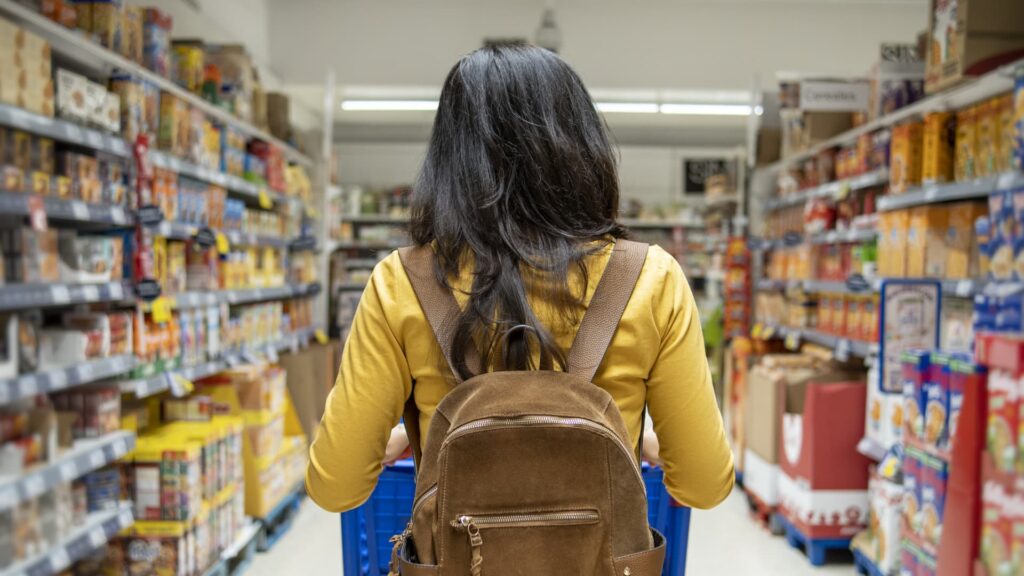Even with no overall increase in food prices last month, Americans are still paying more for tariff-sensitive staples like coffee, sugar and bananas — and new import taxes could soon push those costs even higher.
Food prices were unchanged from June to July but remained 2.9% higher than a year ago, above the Federal Reserve’s target inflation rate of 2%, according to the Bureau of Labor Statistics’ consumer price index report released Wednesday.
Some grocery prices are up double digits over the past year
Food costs are among the most volatile parts of household budgets, shifting quickly due to weather events, disease outbreaks and global supply disruptions — all trends that have played out and boosted prices over the past year.
Droughts in the Great Plains have increased feed prices and shrunk cattle herds, pushing up beef costs. Heat and drought in Brazil and Vietnam have reduced coffee harvests. Another wave of avian flu in the U.S. has cut into egg-laying flocks. And poor sugar harvests in India and Thailand have tightened supplies, contributing to higher candy and sweets prices.
“These shocks often appear suddenly and ripple through the supply chain, leading to double-digit increases in certain items even when the overall food index is relatively stable,” Mario Macis, professor of economics at the Johns Hopkins Carey Business School, tells CNBC Make It.
Here are some of the biggest year-over-year price changes in key food categories, based on July’s CPI data:
Eggs: +16.4%Coffee: +14.5%Beef and veal: +11.3%Candy and chewing gum: +7.5%Meats, poultry, fish and eggs (overall): +5.2%Sugar and sweets: +5.1%Bacon and related products: +4.6%Bananas: +4.3%Nonalcoholic beverages: +3.6%
“Even if overall food prices are flat for a month, consumers notice increases in key staples they buy frequently, like beef, eggs or coffee,” says Macis.
And while not all food prices are rising as quickly, people are still feeling the pinch from cumulative food price inflation. Since 2020, food costs have increased 26%, per CPI’s data.
“The level of inflation has slowed from the peaks of two years ago, but food prices remain high compared to before the pandemic,” says Chedly Louis, vice president of corporate finance at Moody’s Ratings, who covers several major grocery retailers.
Just over half of Americans say grocery prices are a major source of stress, making it the most commonly cited financial worry in a July poll from the Associated Press-NORC Center for Public Affairs Research.
Tariffs could push prices higher
Some of the same goods seeing the biggest price increases in the past year could become even more expensive under new U.S. tariffs.
About 75% of food products imported into the U.S. already face import duties, with many rates in the 10% to 30% range, according to the Tax Foundation. Since Aug. 6, 2025, Brazilian coffee has been subject to a 50% tariff, for example — a cost U.S. roasters are likely to pass on, the Tax Foundation says.
“Coffee beans are almost entirely imported, so a tariff would directly raise costs for roasters,” that would be passed on to consumers, says Macis. “Even tariffs on non-food items, like packaging materials, can push up retail food prices indirectly.”
That said, since many tariffs have only recently taken effect or are delayed, the full impact on grocery costs isn’t yet clear and may not yet be reflected in BLS data.
Most agricultural products imported into the U.S generally have zero tariffs under the United States-Mexico-Canada Agreement, which could help limit the impact on trade with Canada and Mexico even as other imports face higher duties, says Louis.
“It’s too early to quantify the risk because the tariff story is still evolving,” Louis said. “We might see more of an impact toward the end of the year, especially during the holiday period when demand [for groceries] is higher.”
Want to stand out, grow your network, and get more job opportunities? Sign up for Smarter by CNBC Make It’s new online course, How to Build a Standout Personal Brand: Online, In Person, and At Work. Learn from three expert instructors how to showcase your skills, build a stellar reputation, and create a digital presence that AI can’t replicate. Sign up today with coupon code EARLYBIRD for an introductory discount of 30% off the regular course price of $67 (plus tax). Offer valid July 22, 2025, through September 2, 2025.
Plus, sign up for CNBC Make It’s newsletter to get tips and tricks for success at work, with money and in life, and request to join our exclusive community on LinkedIn to connect with experts and peers.


